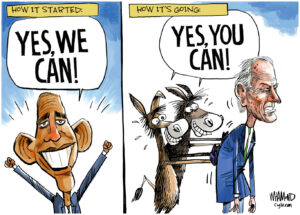Looking Beyond Race
Although racial politics apparently still has a place in the national discourse, there are times when an emphasis on unity is necessary. According to Boyarsky, Barack Obama's win in South Carolina last weekend reflects his appeal among voters across a broad demographic range and among the diverse volunteer squad rallying support for him in California.
Perhaps America is moving beyond racial politics.
I’ve had that thought the past several days as I followed Sen. Barack Obama’s grass-roots campaign in California, one of the big prizes on Feb. 5, Super Tuesday, when 22 states and American Samoa will choose delegates to the Democratic National Convention. Blacks, whites, Latinos and Asians were among the many volunteers I saw working together.
My feelings were reinforced Saturday when Obama overwhelmingly defeated Sen. Hillary Clinton and John Edwards in the South Carolina primary with 55 percent of the vote.
But most important, exit polls showed that 24 percent of the state’s white voters backed the African-American candidate, more than earlier surveys had anticipated. Half of white voters younger than 30 voted for Obama. About a third of whites with college degrees and with family incomes of more than $100,000 a year supported him.
Ben Szobody reported in the Greenville, S.C., Times that “counties and … precincts high in nonwhite voters gave Obama a crushing advantage as expected, but he also won in eight of the 10 whitest counties in the state and in Augusta Road, Cleveland Street and Paris Mountain precincts where nonwhites are 8 percent or less of the registered voters.”
Obama put it this way in his victory speech: ” … We have the most votes, the most delegates and the most diverse coalition of Americans that we have seen in a long, long time. … They are black and white, Latino and Asian and Native American. They are Democrats from Des Moines and independents from Concord and, yes, some Republicans from rural Nevada. And we’ve got young people all across this country who’ve never had a reason to participate until now.”
Obama accomplished this in the face of a rough attack by Sen. Clinton and her husband, who waded into the fight with a fury atypical of a member of the ex-presidents’ club, a group usually known merely for being bland and picking up large lecture fees.
Although the Clinton camp denied it, the attacks seemed to be designed to bring up the racial factor in the South Carolina campaign, to portray Obama as a black candidate, rather than one who campaigns above race.
In fact, after the South Carolina vote, Bill Clinton kept it up. He compared Obama to the Rev. Jesse Jackson, who as an African-American candidate carried the state in 1984 and 1988, but was never given a chance to win the presidency. “Jackson ran a good campaign and Obama ran a good campaign here,” Clinton said.
Obama has worked hard to transcend race, as was clear on election night in South Carolina when he gave his victory speech on a stage with white men and women standing behind him.
The personal canvassing being used by the Obama campaign is well suited to this kind of electorate. It is up close and personal. The canvassers tell their stories, which, as I saw at the volunteers’ meeting, do indeed transcend race.
Such campaigning is a welcome contrast to the television advertising that dominates big-state politics.
Television advertising, screaming for attention, emphasizes differences between people. Obama will use television, of course. But his army of volunteers is trying to bring people together. It would be nice to think that this will set the tone for the presidential campaign, but we all know much mud will be slung in the days ahead.
Dig, Root, GrowThis year, we’re all on shaky ground, and the need for independent journalism has never been greater. A new administration is openly attacking free press — and the stakes couldn’t be higher.
Your support is more than a donation. It helps us dig deeper into hidden truths, root out corruption and misinformation, and grow an informed, resilient community.
Independent journalism like Truthdig doesn't just report the news — it helps cultivate a better future.
Your tax-deductible gift powers fearless reporting and uncompromising analysis. Together, we can protect democracy and expose the stories that must be told.
This spring, stand with our journalists.
Dig. Root. Grow. Cultivate a better future.
Donate today.








You need to be a supporter to comment.
There are currently no responses to this article.
Be the first to respond.